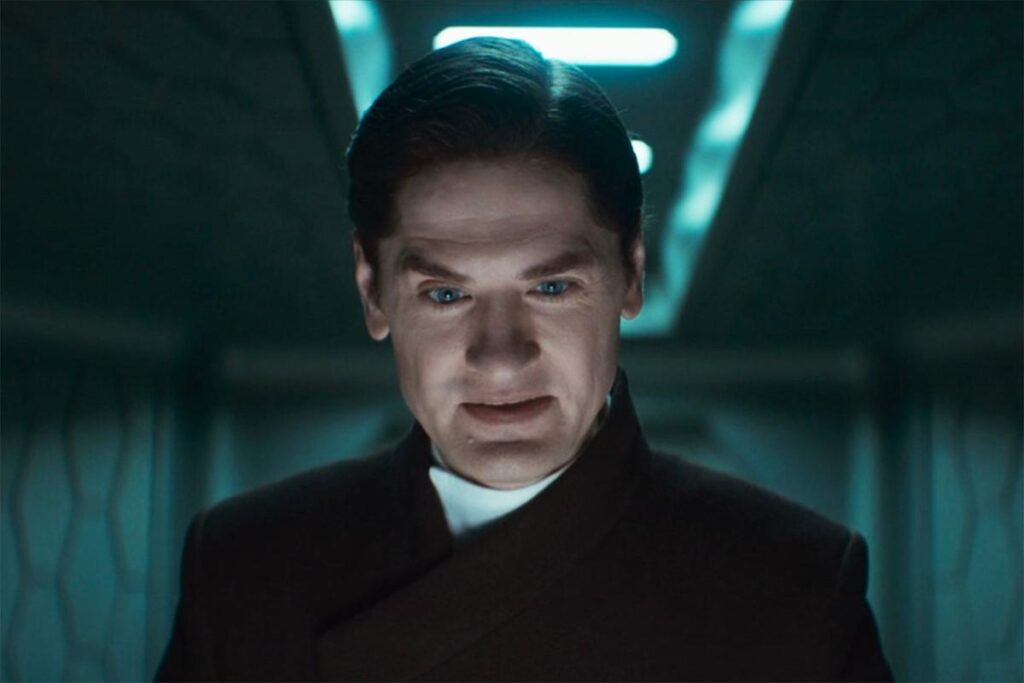Well, he had me fooled. Which is stupid of me, I know. Nothing we’ve seen or heard from Syril Karn on Andor has ever indicated he was anything but an anthropomorphized tongue looking for a boot to lick. The idea that he’d voluntarily stop, especially when some of the boots he’s been licking are worn by Dedra Meero, is preposterous.
Even so, when he started questioning the Empire’s propaganda against the people of Ghorman, the planet where he’s now stationed, I bought it. The opening of the episode tells us it’s ONE YEAR LATER, and a lot can change in that time. Perhaps being on Ghorman, surrounded by Ghor people, immersed in Ghor culture, really did awaken a sense of injustice in him regarding what they’re saying about these people and this planet on the Imperial news. Maybe he really is grossed out by hearing his awful mother espouse base, thoughtless anti-Ghor bigotry. Maybe Syril Karn really is ready to talk to the local rebels about how to thwart the Empire’s ambitions.
Naaaaaahhhhhhhh! It’s all a ruse, of course. From his perch at the boring Bureau of Standards, Syril is deliberately sending up anti-Empire smoke signals. He hopes he’ll attract the Ghorman Front, the actual Rebel group at work on the planet, and thus help his intelligence-officer girlfriend, Dedra, to take down them and any outside agitators brought in to help.
And the plan works. Syril is invited by a young Rebel to a town hall where the residents of the capital city of Palmo voice their outrage that the mysterious Imperial construction project is blotting out the sun over the memorial to several hundred people massacred by the original trilogy’s Grand Moff Tarkin several years ago. And what exactly are they building, anyway? Rumor has it it’s an armory — why would the Empire need a fortress in the middle of this peaceful planet? The Rebels hope Syril can provide them with the answers, though I don’t think they’d like the real solution he’d propose for their problem.
Back on Coruscant, Dedra greets Syril’s reports with mild enthusiasm; she needs something more concrete before she can take the intel to her boss, Major Partagaz. His conversation with Carro Rylanz (Richard Sammel), aristocrat and politician turned Rebel, is probably the breakthrough she’s looking for. But in the meantime she’s also concerned with the progress of Axis, the operation she’d been running before getting switched over to the Ghorman scheme. Cassian Andor remains the only person they know for a fact has had contact with the shadowy Rebel leader who goes by that codename, and he remains at large.
But perhaps not for long. Cassian and his once-again girlfriend, Bix, spend their time between missions in a dreary safehouse apartment (with a tremendous view, like pretty much everything on Coruscant), waiting for the signal from Luthen “Axis” Rael to begin their next operation. Bix is haunted now not only by her PTSD nightmares of her Imperial torturer, Dr. Gorst (Joshua James), but also by the death of a soldier Cassian murdered because he’d seen Bix’s face and could thus identify her if questioned. She actually pictures the man in Gorst’s torture chair, her subconscious directly connecting her and Cassian’s ruthlessness with that of the Empire. When Cassian’s not around, she’s taking some kind of drug to ease the pain.
Cassian’s next mission, which he’ll be handling solo, will take him to Ghorman. It’s supposed to be a relatively “clean” situation — all Cassian is there to do is observe and report on Rylanz and his organization, so he can tell Luthen if they’re worth backing. But Cassian and Syril will recognize each other the moment they’re in the same room, and Dedra’s hunt will be on again in earnest.
Of course, Luthen knows Dedra has taken a direct interest in Ghorman: Her double-agent colleague, Supervisor Lonni Jung (Robert Emms), is Luthen’s mole in Imperial intelligence. After complaining during a meeting that they’re simply arresting too many people to process — don’t worry, Partagaz assures him, the Emperor is working to make all that sooo much easier — Jung reports this top-secret info about Dedra and Ghorman to Luthen directly. The involvement of a predator like Dedra tips Luthen off that there’s something more to the Empire’s Ghorman operation than meets the eye, and it’s likely this as much as the local rebels that Luthen’s sending Cassian to suss out.
The opening titles also tell us it’s the year “3 BBY” — Before the Battle of Yavin, aka the destruction of the first Death Star at the end of the original Star Wars movie. But right now, Rebel fortunes seem at a low ebb. Axis remains at large, but a top priority. Radical Rebel Saw Gerrera (Forest Whitaker) is out there with his motley crew, preparing an energy-smuggling caper that involves high-tech equipment that he’ll need Wilmon, Cassian and Bix’s old friend, to train him in — for however long that takes.
And Senator Mon Mothma is finding that her old political alliances are drying up. She’s hoping to pass a bill that would expose how the Empire is falsifying crime statistics as a pretext for crackdowns, as they’ve done on Ghorman and elsewhere. But she can’t even find support from Ghor’s own Senator Dasi Oran (Raphael Roger Levy), because he dares not risk upsetting the Emperor. Silencing yourself out of fear of reprisals: Imagine that! Turns out that democratic institutions mean nothing if there’s an all-powerful tyrant at the top that the members of those institutions are too frightened to oppose.
Working from a script by Beau Willimon, director Ariel Kleiman whisks us through a wide variety of environments, all of which feel lived-in and real. The design is tending more and more to the earthy retrofuturism of the original film’s aesthetic, especially the beautifully chunky machinery and the geometric paneling of the ’70s-influenced architecture. This has echoes all the way down to the character level: You learn so much about how things are going simply by contrasting the place Syril lives and works with Bix and Cassian’s dimly lit crash pad.
The character work remains truly formidable. Dedra’s sneering condescension toward her enthusiastic boyfriend seems to come out of her almost by accident, like a leaky faucet she’s given up on entirely fixing. Luthen is a terrifying figure — Stellan Skarsgård is much scarier here than as Baron Harkkonen in Dune — who skulks around in a dark cape like a Sith Lord. That’s a costume choice that is not meant to be taken literally, but which is surely no coincidence if you’re trying to get a handle on the guy’s ideology and methodology.
But the highlight of the episode is quiet, wordless. It’s the moment of parting, when Cassian and Bix simply touch each other, hand to hand. Composer Nicholas Britell’s music is minimal yet lushly romantic here — like their love itself, I suppose, which they’ve forced into the tiny compartment left available for love by the world they inhabit. There’s something truly beautiful in that moment. These people are not deluding themselves that the world is okay, that life is okay, that their own lives are okay. But they love each other anyway, because while the government they live under does not value the things that make us human, we do, we can, and we must.
Sean T. Collins (@theseantcollins) writes about TV for Rolling Stone, Vulture, The New York Times, and anyplace that will have him, really. He and his family live on Long Island.
Read the full article here








